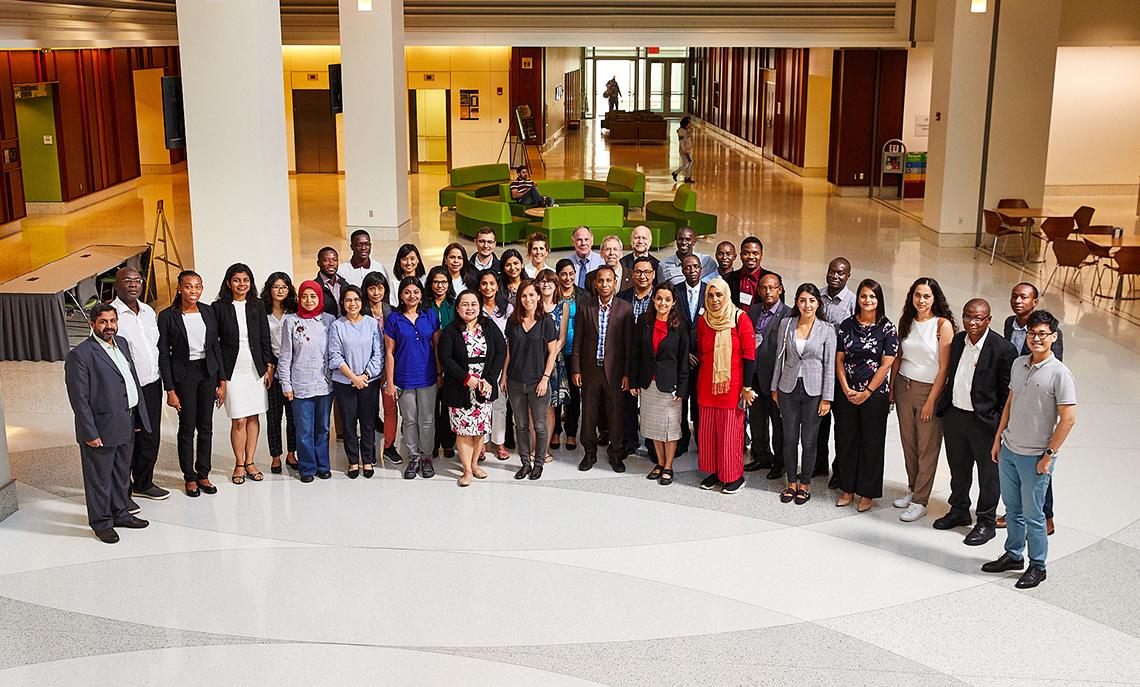NIH Hosts International Summit in Genetics, Genomics

Photo: Ernesto Del Aguila
“Life-changing” and “career-enhancing” were phrases this year’s 34 fellows used to describe their experience at the 2019 NIH International Summit in Human Genetics and Genomics, coordinated by the National Human Genome Research Institute.
Since 2016, the month-long annual summit has sponsored fellows from low- and middle-income nations to visit the NIH campus to expand their knowledge of human genetics and genomics. At this year’s summit in September, fellows hailed from 24 countries including, for the first time, Democratic Republic of the Congo, Ecuador, Eritrea, Mali, Mongolia, Myanmar, Romania, Sudan and Vietnam. Participants included scientists, clinicians, research physicians and dentists, counselors, a nurse and a clinical psychologist.
The trans-NIH initiative had support from 14 other NIH institutes and centers and the Foundation for the NIH. The National Eye Institute hosted five fellows in ophthalmic genetics, representing the largest proportion of the group.
The robust curriculum featured presentations by more than 70 speakers; hands-on workshops on topics such as grant-writing and bioinformatics; field trips to academic and commercial institutions, such as Johns Hopkins University and GeneDX; mentored training; and networking opportunities.
Many fellows involved in genetics research in their home countries sought expertise on their projects.
Henrietta Ifechukwude Monye, an ophthalmology resident at the University College Hospital of Ibadan, Nigeria, studies the perceptions about genetic testing among parents of children diagnosed with genetic eye disease. She noted that the summit empowered her to raise awareness about the potential benefits of genetic testing. “It was also a great opportunity to interact and network, literally, with the world,” she said.
Dr. Kudakwashe Mhandire, an HIV genetics researcher at the University of Zimbabwe, said that the summit experience gave him perspective on genetic practices that could be feasible and sustainable in resource-poor settings, such as Africa.
Dr. Norita Binti Hussein, a primary care clinician at the University of Malaya in Kuala Lumpur, credited the summit with helping her build leadership skills to help develop a team to promote genetics and genomics education in primary care.
The summit creates momentum to integrate genetics and genomics in research and medicine through international cooperation and collaborations, according to NHGRI’s Manjit Kaur, the program’s administrator. Collectively, in just this past year, the 2016-2018 fellows have published 177 manuscripts in their fields of expertise, involving genetics. In addition, 53 have written or received grants from NIH or other funding institutions and many have established collaborations and initiated new research projects.
The summit is in popular demand, with numerous requests from participants for its continuation, according to Kaur.
“For its final year in 2020, we hope we have the necessary support to host up to 40 candidates,” she said.
The deadline for applications is Nov. 29. For more information visit https://youtu.be/XLbxHa4vw3g.
